OUR BURNING PLANET
The making of the first SA Youth Climate Action Plan
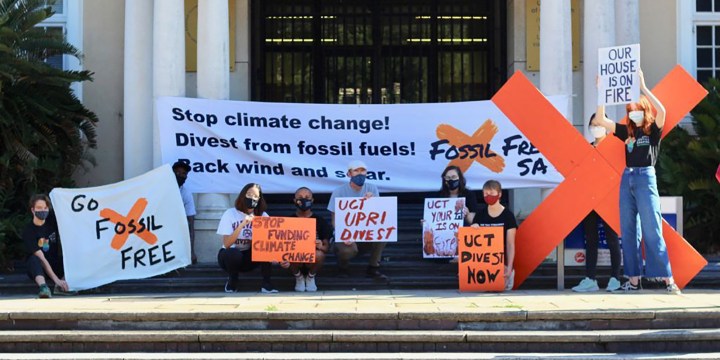
The Youth Climate Action Plan includes stories of young South Africans’ experience with climate change and will be used as a guide for decision-makers and other stakeholders. It is set to be revealed in October, preceding the COP26 climate change conference.
“They’re the experts of their lived experience. And if you discount them, because they’re not using your technical jargon, you’re doing a huge disservice to the intellect and knowledge of young people,” says Tyler Booth (22), one of the four project leads for the first South African Youth Climate Action Plan, set to be launched in October.
Hundreds of young people from all over South Africa have contributed to the Youth Climate Action Plan (Ycap), which includes inputs from the young (aged 13-30) on policy recommendations and showcases the stories of young South Africans’ lived experience of climate change.
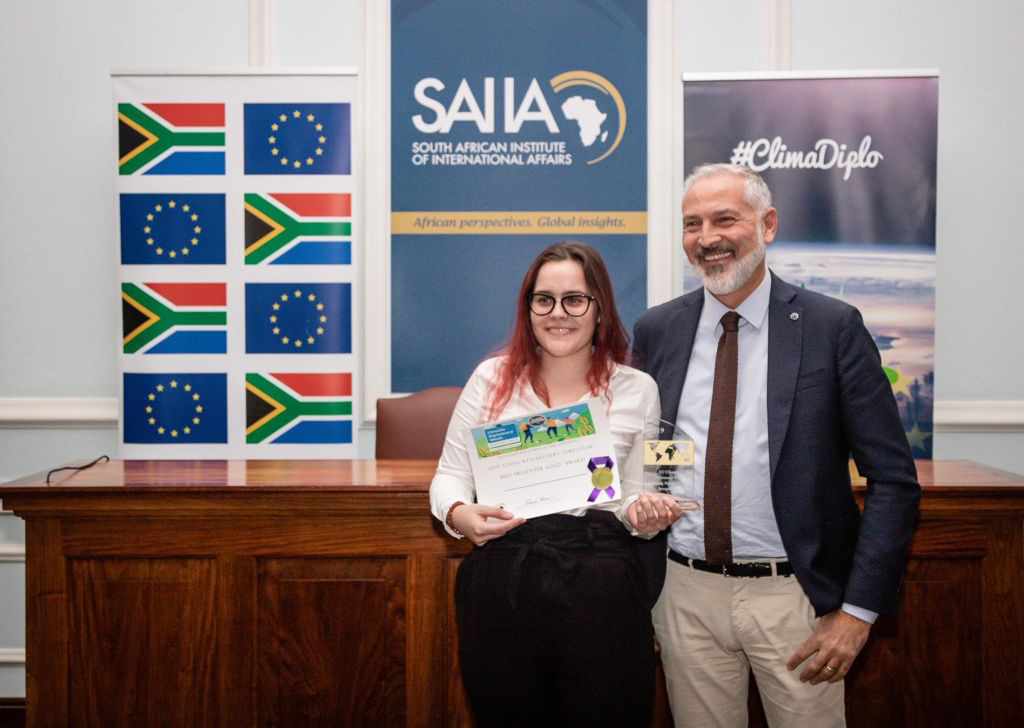
Tyler Booth (left) with Roberto Cecutti from the EU during the 2019 Young Researchers Symposium in South Africa, where Booth received the gold award for best presenter for her research paper on climate change and water. (Photo: Tyler Booth)
The Ycap is being convened through the youth programmes at the South African Institute of International Affairs (SAIAA) in partnership with various organisations, schools and university groups and will be used as a framework to inspire youth-led action across the country and serve as a guide for government, decision-makers, civil society, business, academia, and other stakeholders.
One of the stakeholders is the Department of Forestry, Fisheries and the Environment (DFFE), which is aware of the process of the Ycap but declined to comment on it before its release. Booth explained that they have been in conversations with the DFFE because the process of the Ycap ran alongside the recent publication of the proposed Nationally Determined Contribution, which they’ve made suggestions to.
“They’re very much aware, and they’re very much open to receiving it,” said Booth.
Other stakeholders aware of the Ycap are the National Business Initiative and members of the Presidential Climate Commission — who are keen to use Ycap as a lobbying tool and use it to represent youth voices in the country.
The Ycap was born out of Booth and others’ involvement in the City of Johannesburg’s Climate Action Plan, which came out in March.
After working on policy for the 2021 City of Johannesburg Climate Action Plan, Booth, along with several other young people from Johannesburg, wanted to give young people a voice in climate action on a national scale, and so began gathering leads for the Ycap in March.
Along with the four project leads, whose role includes the declaration of the plan, collection of leads, drafting and editing of the Ycap, there are 20 coordinators whose role was to collect inputs from their communities.
The collection of leads closed last Friday, 13 August, and now the editing process has begun. The Ycap is set to be published in early October, before the 2021 United Nations Climate Change Conference (also known as COP26), convenes on 21 October, in Glasgow, to ensure South Africa is part of the voices from the global south being heard at the conference.
Desiree Kosciulek, head of the youth programme at SAIIA, said they are hoping to formally launch the plan before South Africa finalises its position for COP26, which is usually decided just before every United Nations Climate Change Conference under the National Climate Change Committee.
Then next year, their focus will be on localising the Ycap at different schools, communities and universities and lobbying it as a framework for climate action and planning.
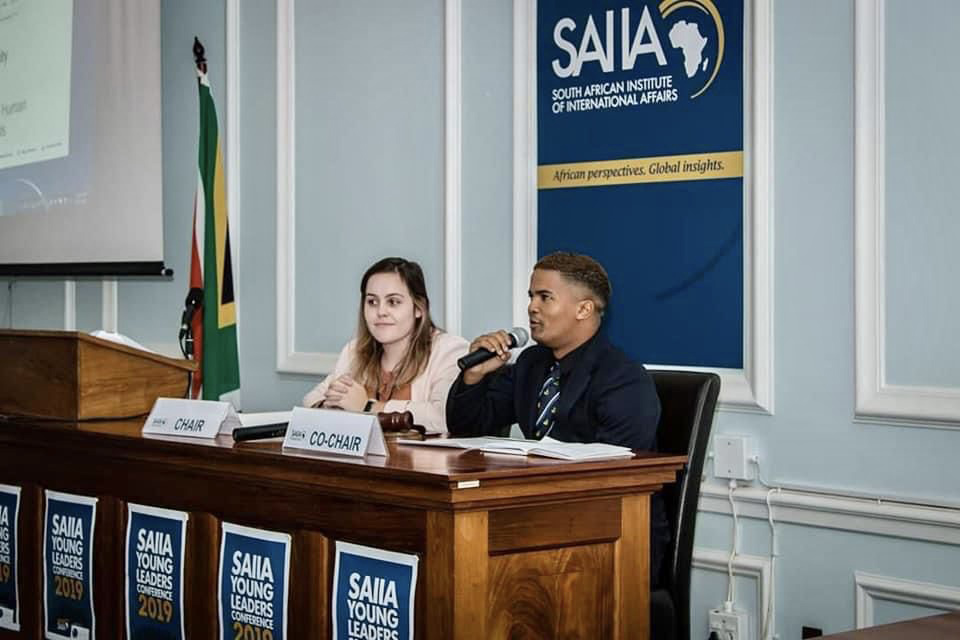
Tyler Booth (left) with Caleb Kay, one of the other project leads for the South African Youth Climate Action Plan (Ycap), at the 2019 SAIIA Young Leaders Conference. SAIIA convened the Ycap process. (Photo: Julia Evans)
Booth and Kosciulek estimated that more than 200 different high schools (private and public) from all nine provinces, at least 60 different organisations, several universities (including the University of Cape Town, Wits University, University of Venda and University of KwaZulu-Natal, to name a few) and more than 500 individuals had submitted inputs and contributed to the Ycap.
“Last week we had a Model Parliament whereby we had about 100 young high school students from about six different provinces give inputs,” said Kosciulek.
Inputs were also submitted through the conference at the start of the Ycap process in March, multiple national workshops and meetings since then and through the story submission hotline, where anyone between the age of 13-30 years old can send in a written story, video or voicemail of their lived experience.
The effects of climate change are being felt now
Booth said that from the recent Intergovernmental Panel on Climate Change (IPCC) Sixth Assessment Report, two things are clear.
First, we are already seeing the effects of climate change, and second, urgent action needs to be taken, but with that action there must be a just transition.
“We need to make sure that the transition is truly just, because we know how vulnerable South African people are geographically, but also historically, politically and socially,” said Booth. “A lot of people are relying on industry, such as the coal industry. It’s very difficult to tell someone, ‘We’re taking away your job to save your future.’
“Right now, food on the table and a means of livelihood is important. We need to make sure that in that transition these people are not left behind, that they’re upskilled, reskilled and that there is that infrastructure to allow that change.”
Coleen Vogel, Wits professor, climatologist and contributing author on several IPCC reports, told Daily Maverick, “With increased carbon emissions there are associated linkages to the climate system that can result in changes in climate. These emissions are being influenced by humans and how we live. Changes in the atmosphere, ocean and biosphere have occurred.
“Human-induced climate change is also already affecting many weather and climate extremes such as heat waves, heavy precipitation, droughts and tropical cyclones.”
Vogel says that southern Africa is projected to become drier and warmer, and that this will have implications for food and water security. Vogel lists effects such as, “Temperature increases that range between four and 6°C over the interior; increases in very hot days; heat waves (some of these are already occurring); multi-year droughts may plausibly occur; increases in extreme rainfall events in northeastern South Africa, Mozambique and Zimbabwe.”
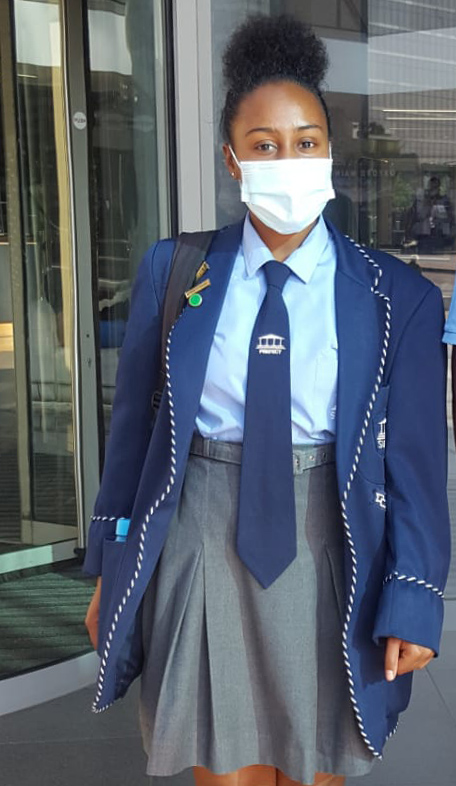
Damatria Ntintili, 17, a story lead coordinator for the Youth Climate Action Plan says, ‘there isn’t enough awareness, education, and urgency in our communities about climate change. Yet, we are set to face the most crucial effects of climate change because we are at the bottom of it all.’ (Photo: Damatria Ntintil)
A story lead coordinator for the Ycap, 17-year-old Damatria Ntintili from Rhodesfield, said she joined young people at SAIIA programmes and the Ycap process because she has personally experienced the effects of climate change in her community.
Ntintili first took notice of climate change when she was in Grade 2. “A couple of years ago, it snowed in South Africa, particularly in my community, in Gauteng,” said Ntintili, “and it’s not supposed to snow, it is quite odd. So I think from then on, that just kind of became my entry point into climate change. Like, why do certain weather patterns take place in areas where they’re not supposed to?”
Ntintili learned more about the effects and urgency of climate change from participating in the youth programmes at SAIIA. She said that many people in her community and in informal settlements aren’t aware that droughts and heat waves are a consequence of climate change. “Climate change isn’t something we learn at school. It’s more you learn about global warming, and then you go on to the next chapter.”
Older members of her community think that climate change is a political issue and doesn’t involve them, or they give more credence to other issues like poverty or gender-based violence.
“Not enough is being done to combat climate change,” says Ntintili, who is a Grade 11 student at Supero Combined School in Kempton Park. “There isn’t enough awareness, education, and urgency in our communities about climate change. Yet we are set to face the most crucial effects of climate change because we are at the bottom of it all.”
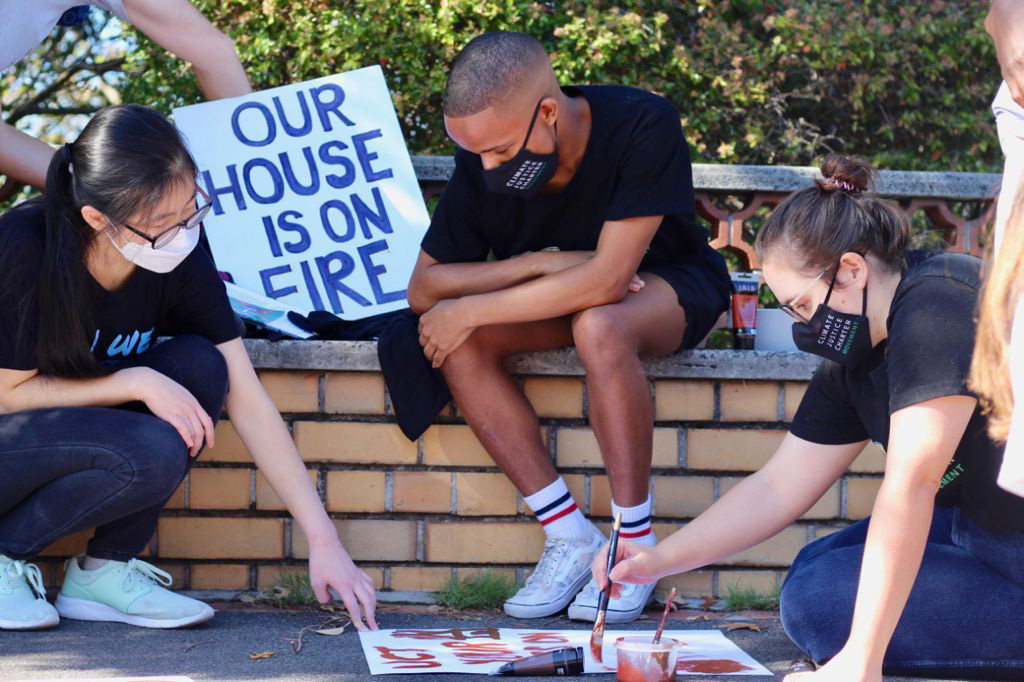
Sibusiso Mazomba (centre) is an Implementation Lead and was also involved in the Joburg Ycap editing. (Photo: Tyler Booth)
The effects that Ntintili has personally experienced and seen in her community include droughts, water restrictions and heat waves, which affect agriculture, food and water security.
Additionally, Ntintili observed that during the pandemic heat waves affected learning, “especially if you’re in a public school and you have these mobile classrooms, it’s extremely hard to focus. And there’s these heat waves and the mobile classrooms aren’t insulated.”
As a story lead coordinator for the Ycap, Ntintili says, “I get to read, view, listen to stories of youths’ lived experiences of climate change. And from there I got to really see how climate change impacts youth.”
Ntintili said that significant observations that came out of these collected stories were that climate change led to job losses and that women in South Africa are the most vulnerable to the effects of climate change.
She learnt that often after crop failures caused by heat waves, women were the first to lose their jobs. “I’ve seen that women are most vulnerable, especially single mothers and grandmothers, who are the breadwinners in a household.”
Additionally, Ntintili had reports of people’s health being affected by the heat waves, (such as people working long hours outdoors in the heat getting sick) and that the poor were most affected by the effects of climate change.
Why should youth have a voice in climate policy?
If you’re reading this and wondering, what role do youth have in policy making and what do they actually understand behind the science and complexities of climate change, you won’t be the first.
However, many young climate activists will argue that they do deserve a place at the table.
Booth cited Unicef’s 2017 report that stated close to 50% of Africa’s population is under 18, and pointed out how this demographic is not reflected in decision-making spaces.
“I think young people need to be reflecting those spaces, to also ensure that young people are driving the changes they want to see happen, so that things aren’t happening for them. It’s happening with them and being led by them.”
In terms of being too young to understand, Booth said, “I think it’s not necessarily about not understanding the complexities, but living and experiencing it in a different way.
“So if we talk about climate change, people think of this far distant thing that’s not affecting their everyday life. But if you’re someone who’s grown up in informal settlements, and has had to rely on a communal tap, or having to walk a distance to collect water, yes you would have realised that okay, well, there’s less water or there’s more frequent droughts, or I have to walk further to get this water.”
Ntintili said, “As South African youth, we have to acknowledge that… our hopes and dreams lie within this land. But if climate change persists, we have to ask ourselves, what land are we looking at?
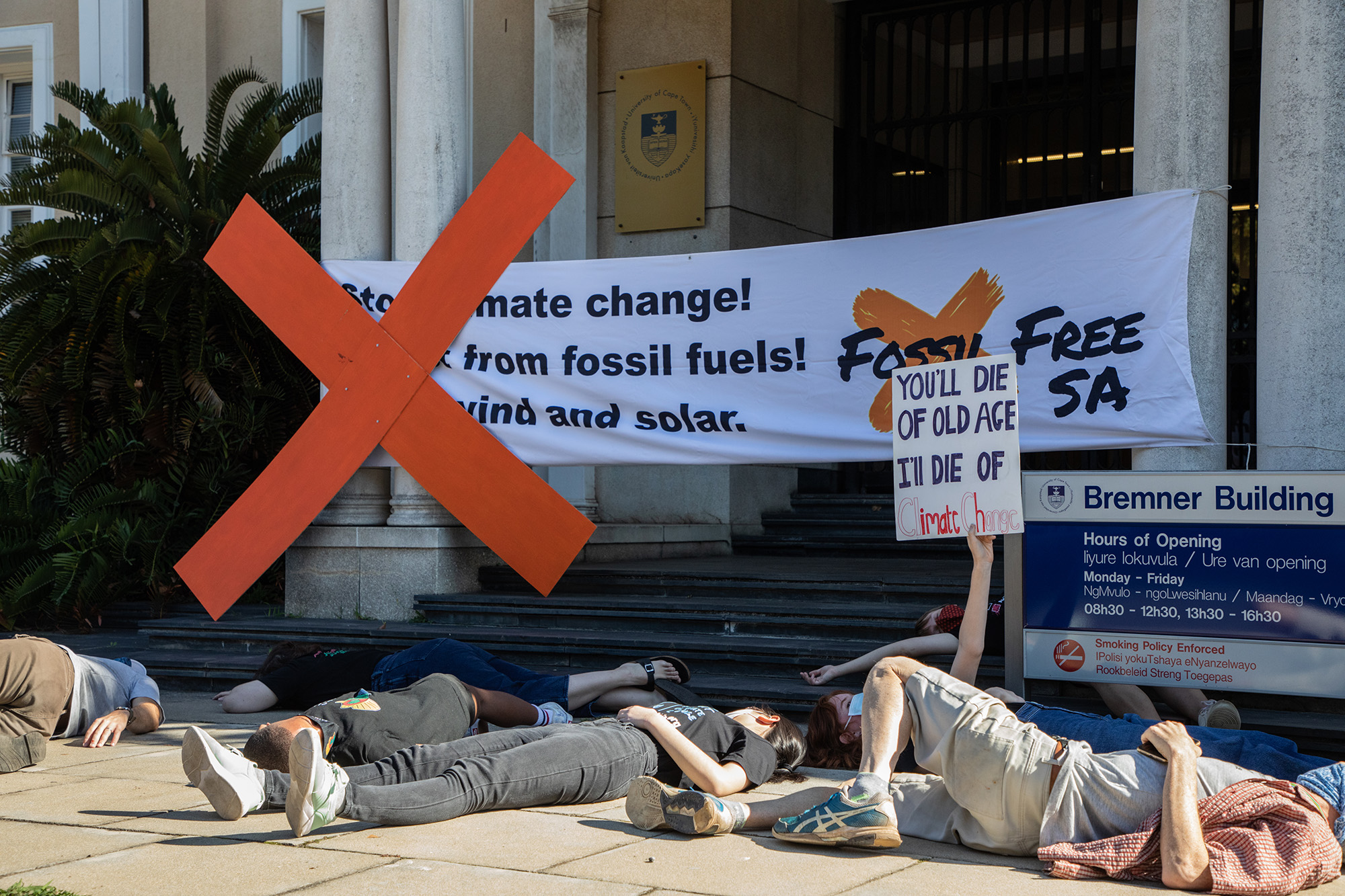
UCT students and members of the Green Campus Initiative, Fossil Free South Africa and the Climate Justice Charter Movement protest on UCT’s middle campus, calling for the university to divest from fossil fuels on Tuesday, 11 May 2021. (Photo: Victoria O’Regan)
“Upcoming generations have to bear the brunt of the consequences of climate change. And as a developing nation, I don’t think we can afford that.
“Policies cannot be made that directly impact us without us as youth having a say in them.”
Vogel, who is an expert in the field of climate science, agrees with these activists, saying, “The youth are the next generation and therefore have a vested interest in ensuring that they have a voice that is heard on various platforms.
“By supporting the Ycap teams I can try and help enhance their understanding of climate challenges, help enable them to be the next generation of leaders and learn from them about key challenges that they think we may face.
“The need for an engaged youth is essential. Youth voices need to be present in all the negotiating spaces on climate change. Through these engagements they can bring their views into the ‘spaces’ and also take messages back to communities etc. Through these changes, climate action can be spurred onwards.” DM/OBP









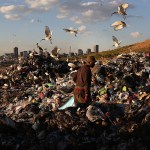








 Become an Insider
Become an Insider
Comments - Please login in order to comment.